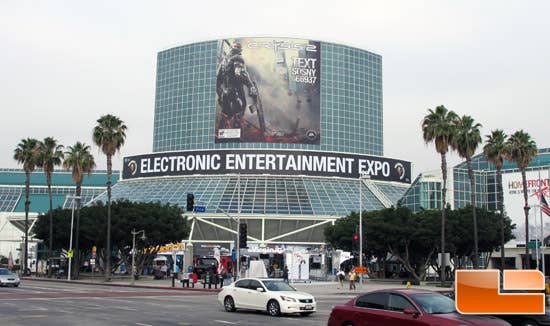E3 is "more relevant than it has ever been" says ESA
We speak with ESA's Rich Taylor about next week's big Expo, the state of the industry and more
E3 2012 officially kicks off next week, and industry professionals from a wide array of companies have been preparing for the big show for the last several weeks. E3 is that one time of year where a good chunk of the industry gathers to strut its stuff. Companies will do all they can to demonstrate to gamers, retail buyers and others in the business that their lineup for the rest of the year is the hottest one around.
That said, in recent weeks there have been questions from industry insiders and journalists (including the GamesIndustry International staff) about just how important E3 actually is today.
We caught up with Rich Taylor, ESA's Sr. VP of Communications and Industry Affairs, to get the trade group's official response on the matter and to discuss the state of the games industry in the US as a whole.
E3 is more relevant and popular now than it has ever been and that is true by any marker used. We have to cap show attendance to ensure the business of the industry can get done. If we opened up the doors, we would easily have more than 200,000 attendees, but we specifically chose not to do that. This helps the industry have an event that's sustainable, manageable, and easy to navigate.
"This year, half of the retailers attending are from outside the U.S. When looking at trade shows, that is a remarkably high figure and one that underscores the importance and global dominance of E3"
Rich Taylor
From Activision to Zynga to the roughly 200 other exhibitors, we showcase the full diversity and breadth of the industry. Each of our exhibitors underscore the fundamental truth that games are at the heart of E3 and it is the one time in the year when so many leaders from so many sectors are gathered together to see what the world will be playing in the year ahead.
We are also diversifying the attendee base and media coverage. More foreign journalists-more than a third of the media attendees-are covering E3 than ever before. We worked hard to also have a strong international representation of retailers. This year, half of the retailers attending are from outside the U.S. When looking at trade shows, that is a remarkably high figure and one that underscores the importance and global dominance of E3.

Just like the industry changes, E3 has and will continue to evolve to ensure that the needs of exhibitors and attendees are met. E3 2012 is different than the show in 2006, which was different than the show in 2001. Each year enhancements are made-whether it's through new exhibitors, new ways of enjoying games, or new attendees that are drawn to the centerpiece of the video game world.
No game companies are marginalized at E3. Because new, small companies share space with industry giants is why exhibitors keep returning to the event. They appreciate that all exhibitors are treated well and equally, including long-time industry players like EA and Disney and new additions like GREE and Zynga. Attendees also enjoy being able to see what how these new exhibitors are innovating just like those who have been in the show for years.
Due to policies in place, that weren't when Kentia was open, we are now able to have small companies and international exhibitors participate on the floors of West and South Halls and in the Los Angeles Convention Center's permanent meeting rooms. We are proud that we can make this opportunity available. That isn't to say that Kentia won't ever reopen and we'll make that determination when the time is right.

I disagree with that feeling. Industry leaders and attendees have praised the current model of the show over the past several years and we constantly strive to deliver that value for our exhibitors and members. E3 has a cap of 45,000 attendees and that hasn't changed over the past several years. The goal is to ensure the show is manageable, navigable, and sustainable. With that limit in place, we hit that mark.
"We are in a state of transition, but we are handling that well. Fact remains, our industry is in a healthy position because more Americans are playing games than ever before"
Rich Taylor
Every year ESA assesses the event and makes determinations based on guidance and direction from our members on the show's future and direction. All our members, large, medium, and small, have an equal opportunity to set the direction for the event and that's one of our ESA member benefits we're most proud of.
That being said, while E3 may be closed to the public, it is widely acknowledged as being a "consumer-facing" event. Among other things, all the press conferences will be streamed live, for the first time there will be a dedicated E3 channel on SiriusXM, and attendees can have behind-the-scenes access through E3Insider.com-all this leads to billions of media impressions worldwide, providing our exhibitors with direct access and communication with consumers.
We are excited about the many new game and technology announcements certain to occur at this year's show. Each year E3 is different and it is hard to predict what exhibitors will show based on console cycles or the past year's sales. There is an incredible breadth of platforms out there for a wide range of consumers and we think this trend will continue. Over the last year, we have also seen new innovations in digital games and game content, and these developments are likely to be on display at E3, along with other inventive products. I expect 2012 will be another exciting year for both gamers and the industry.
We are in a state of transition, but we are handling that well. Fact remains, our industry is in a healthy position because more Americans are playing games than ever before. Let me provide another comparison to illustrate my point. In 2006, the top selling video game was Madden NFL 2007. It was an economic success and sold more than 1.8 million units. Compare that though to the recent launch of Diablo III, which sold 6.3 million units in the first week. That is remarkable growth and illustrative of two important points.
First, game-play is not a passing interest and it is a passion that has staying power. The average adult male gamer today has been playing games for 16 years and females for 12 years. Second, our industry's consumer base is expanding and new gamers start playing every day-often at the expense of other forms of entertainment. 50% of gamers who are playing video games more than they did three years ago are spending less time with other forms of entertainment like movies and watching TV.
Industry sales are shifting more than declining. I believe this provides new opportunities for companies to expand their business and reach new consumers. Electronic Arts, for example, recently reported digital revenue of approximately $1 billion for fiscal year 2012 - more than a quarter of the company's total sales revenue. Ubisoft's digital sales jumped 110 percent to $102 million during the last fiscal year. And in the most recent quarter, digitally delivered content accounted for 19 percent of Take-Two Interactive's net revenue.
According to NPD, fourth quarter digital sales in 2011 generated more than $2 billion in revenue. For the year, that segment of growth resulted in more than $7.3 billion in revenue---the highest figure to-date and a growing trend. In fact, sales of digital game content have grown to 31% of industry revenue-up from 20% three years ago. And this growth is evident in a number of ways, including in a recent report stating that 40% of those who played a freemium game end up making an in-game purchase. In addition, 84% of those who play a free trial version of a game end up purchasing the full title.
The main focus of ESA is doing all we can to support an environment that lets our members and this industry do what they do best and this is create compelling, innovative, and inspiring entertainment. One aspect of that work is the protection of valuable creative works because it benefits both our members and consumers. Fostering a respect for video games and discouraging their theft ensures that more video games will be developed and the investment will be protected-all this benefits consumers and provides a greater amount of entertainment options. Fighting illegal and flagrant piracy is a key concern of ESA and our members.
ESA's position has always been-and will remain-the same: piracy hurts video game developers, consumers, and publishers and must be stopped. The enormous financial and artistic investment that developers put into games should be guarded and we will continue working to enhance those protections.
"From education to healthcare, business and even the arts, games influence virtually every facet of life, and are improving the way we live, work and play"
Rich Taylor
From education to healthcare, business and even the arts, games influence virtually every facet of life, and are improving the way we live, work and play.
I will give you just a couple examples. The Smithsonian American Art Museum in Washington, DC is hosting a video game exhibit, exploring the artistry and history of video games. That's a remarkable development that signals a new-found acceptance of video games. It's also a recognition of what we at ESA have known for years-that video games are artistic and creative achievements on par with the best in literature, movies, an video games.
Additionally, last month, The Joan Ganz Cooney Center at Sesame Workshop released a survey of K-8 grade teachers finding that 50 percent of those surveyed use digital games as teaching tools in their classrooms two or more days per week. Eighteen percent are using them daily. These same teachers reported that students were more engaged, attentive and collaborative since they incorporated digital games into their lesson plans.
In addition, just recently leaders in technology, education and government gathered at The Atlantic magazine's "Technologies in Education Forum" in Washington, DC on May 22 to discuss the critical importance of strengthening students' digital literacy and the educational value of entertainment software. Hosted by The Atlantic and co-sponsored by the Entertainment Software Association, the forum featured three panel discussions that explored the technological tools and innovations available to aid America's educators. The panels also examined the policies and practices that can ensure effective use of these tools. That's a remarkable validation on the new uses and acceptance of games.
This type of validation also goes beyond education. ESA and many of our member companies recently launched a campaign with the President's Council on Fitness, Health and Nutrition that utilizes video games as a key component in improving the health of America's children.
All these examples, and many others, showcase the new and improving way that games are being accepted and utilized in America.
ESA is working in a number of states to enhance tax incentives for the industry and there are many success stories, including Texas and Louisiana. Both those states aggressively pursued and implemented incentives and saw a remarkable return on their investments. More than 20 states have incentives because they realize that the investment made in the industry is rewarded with high-paying, long-term jobs staffed by employees committed to their local communities.

